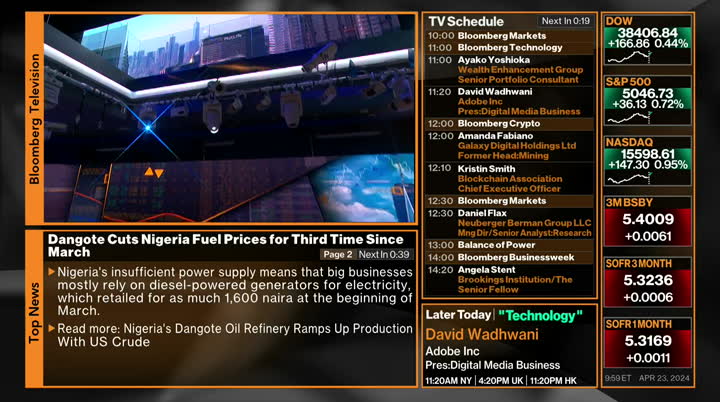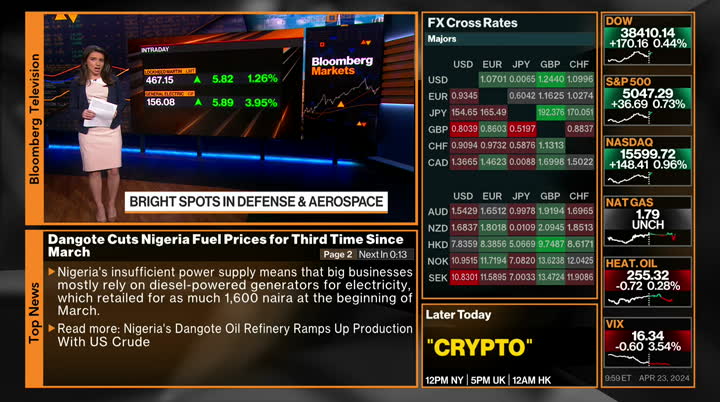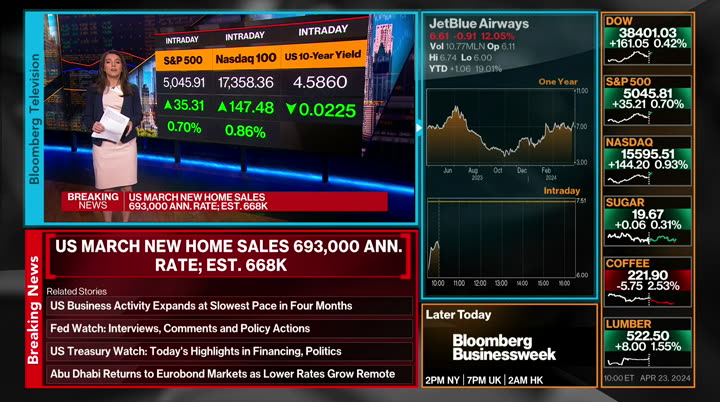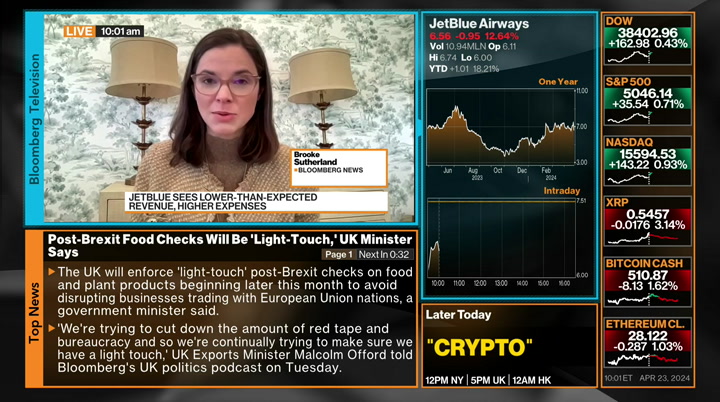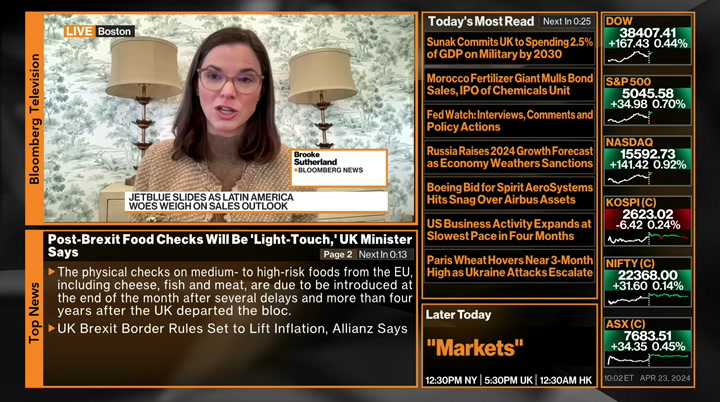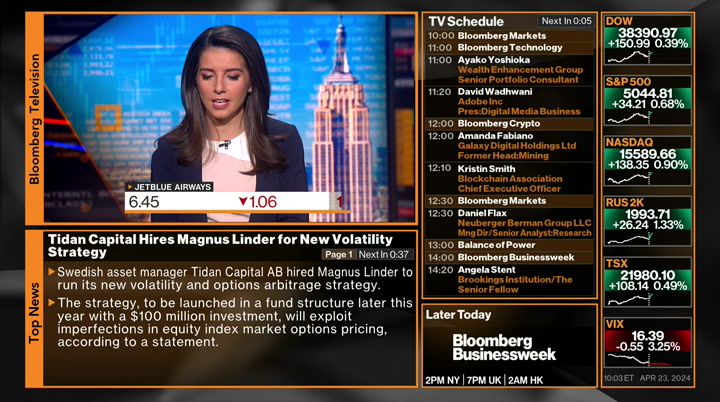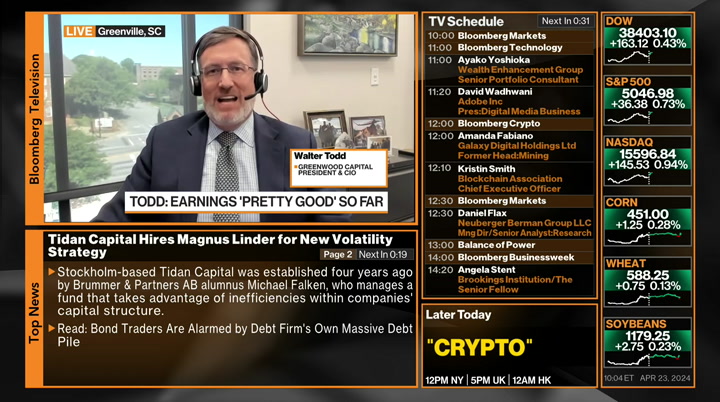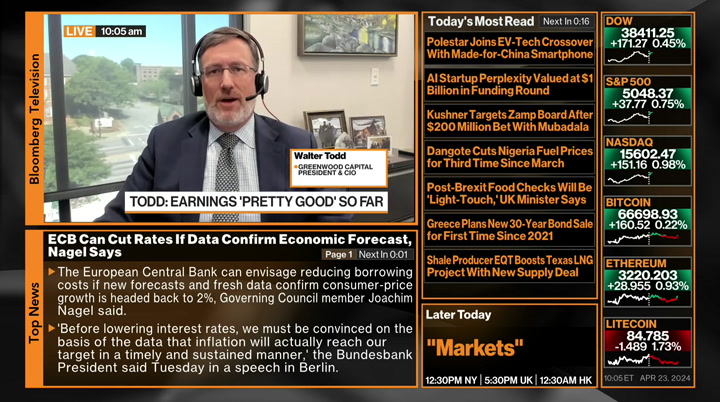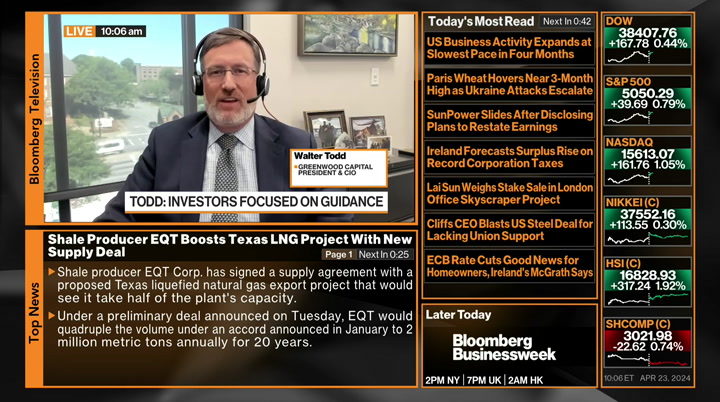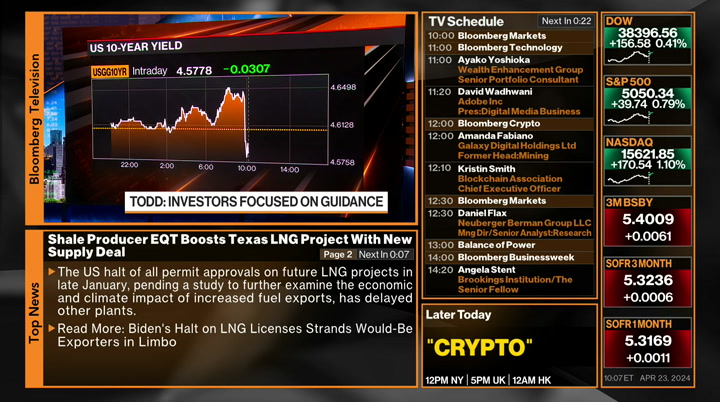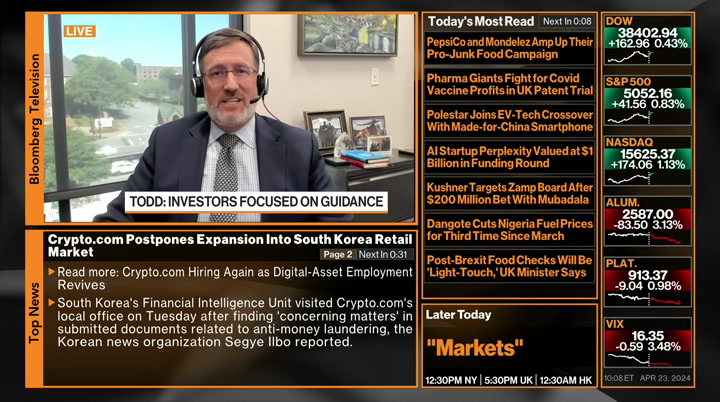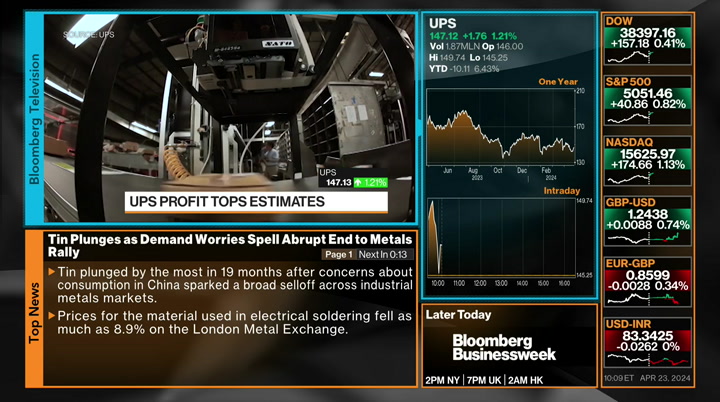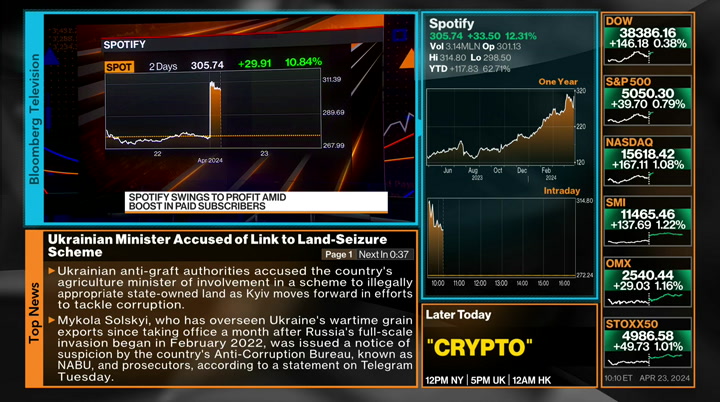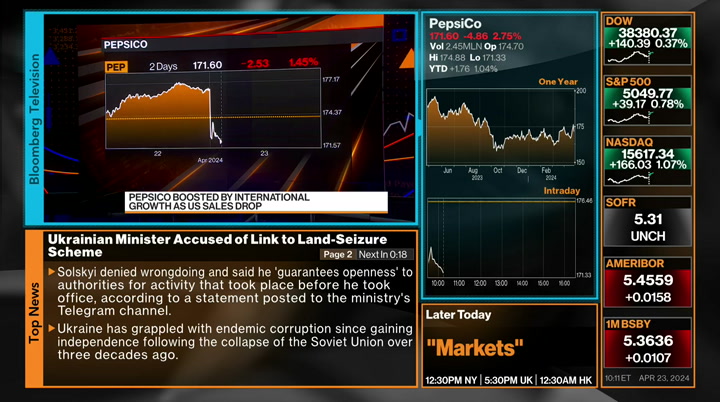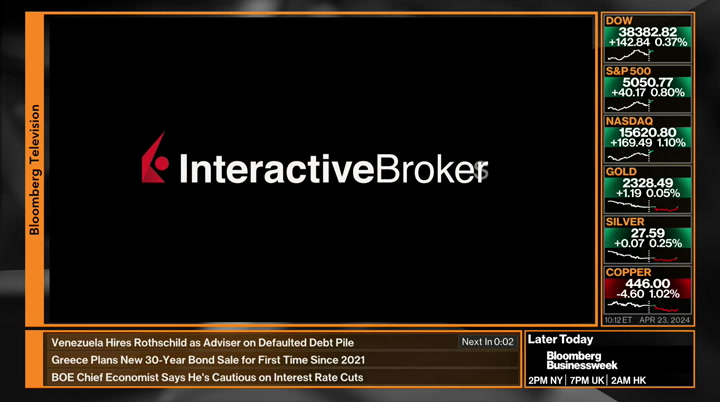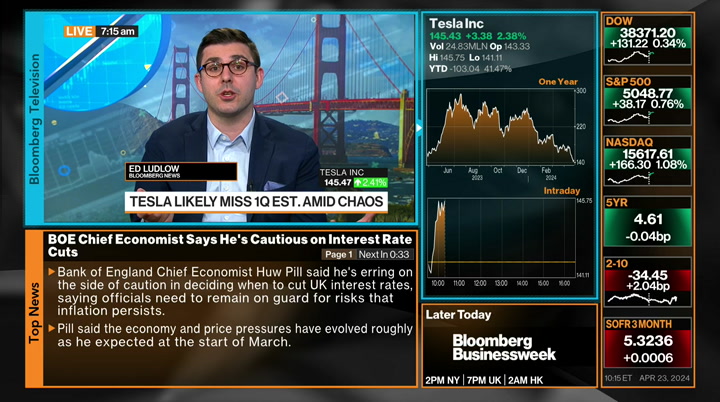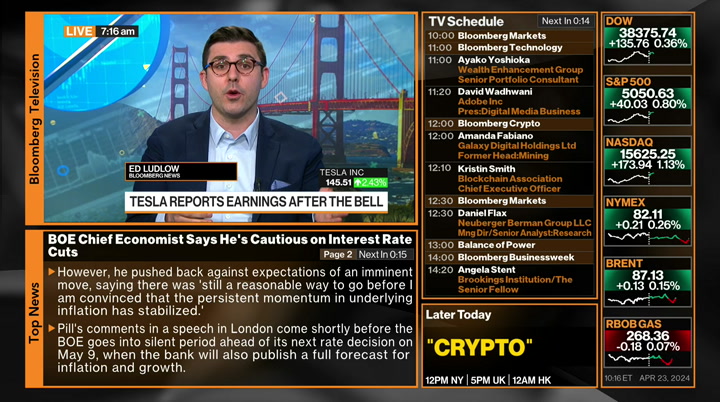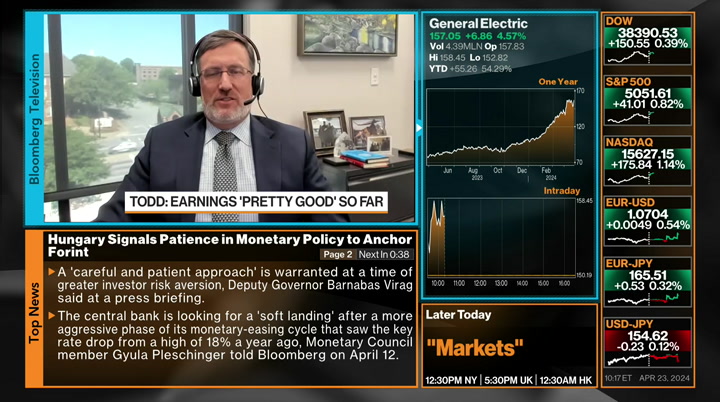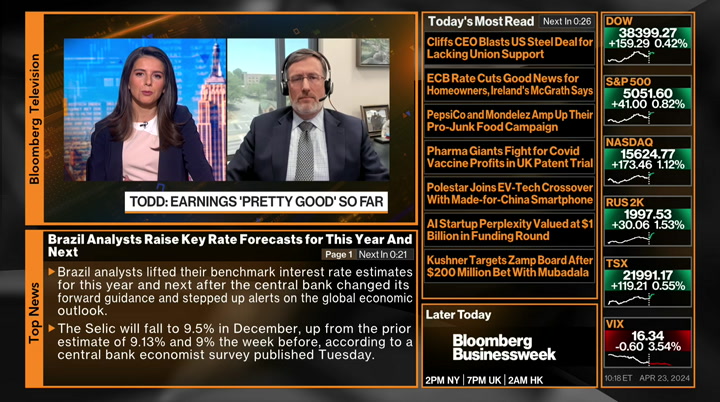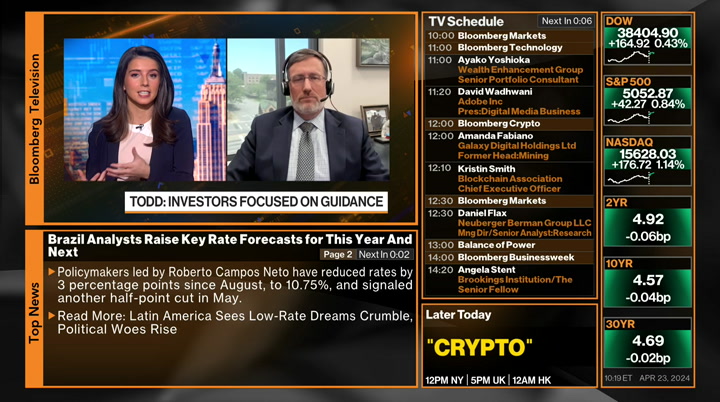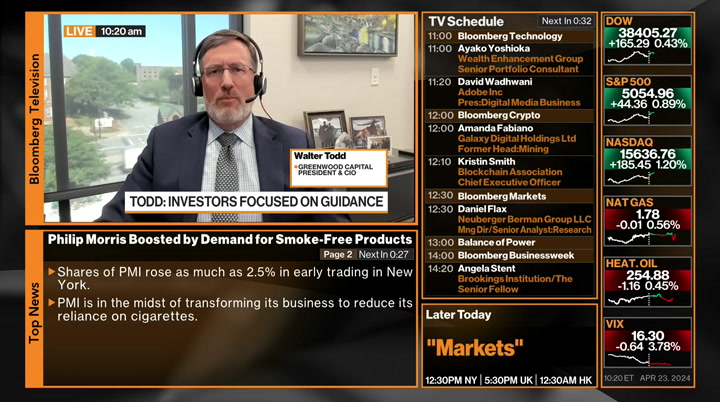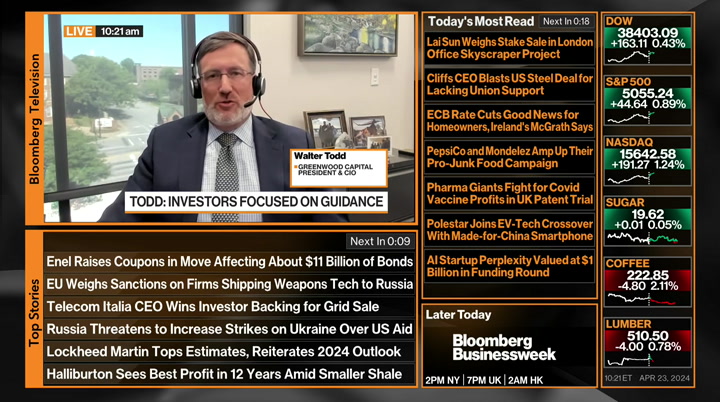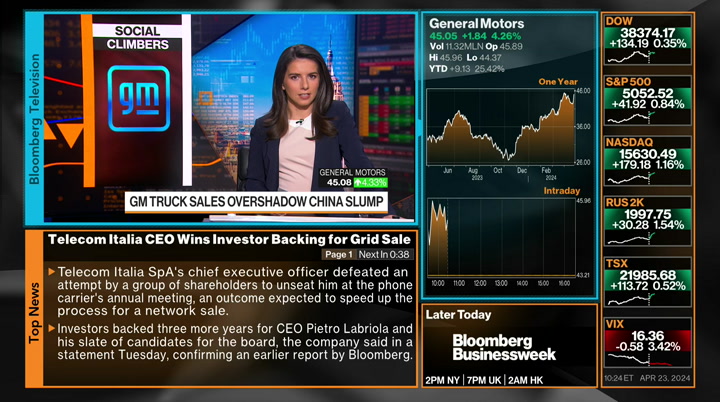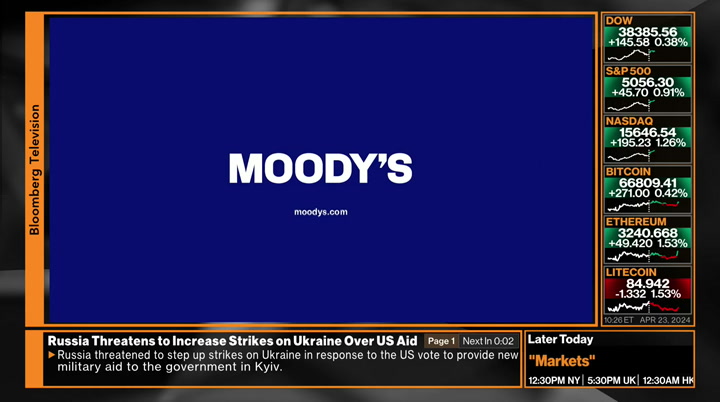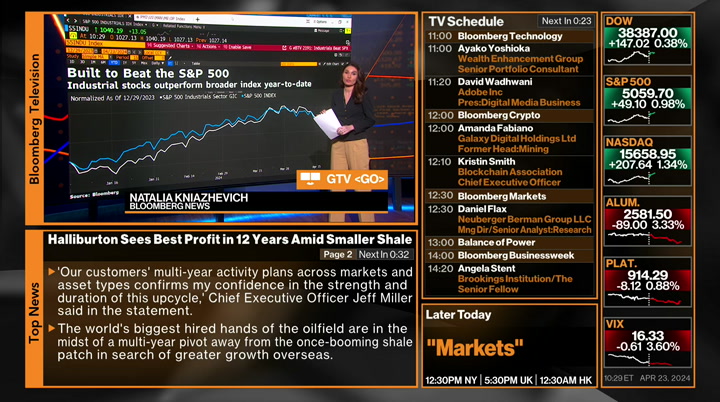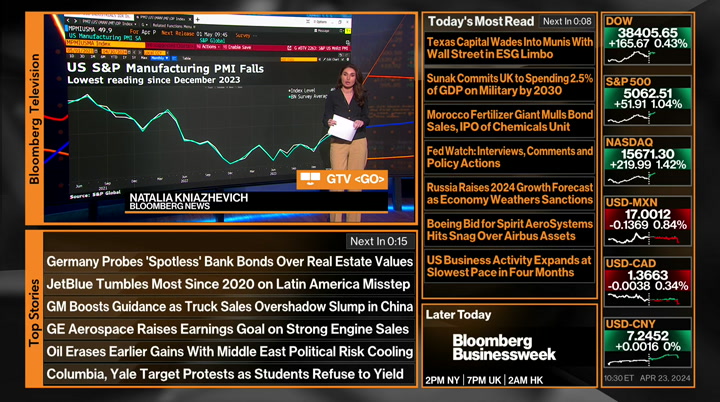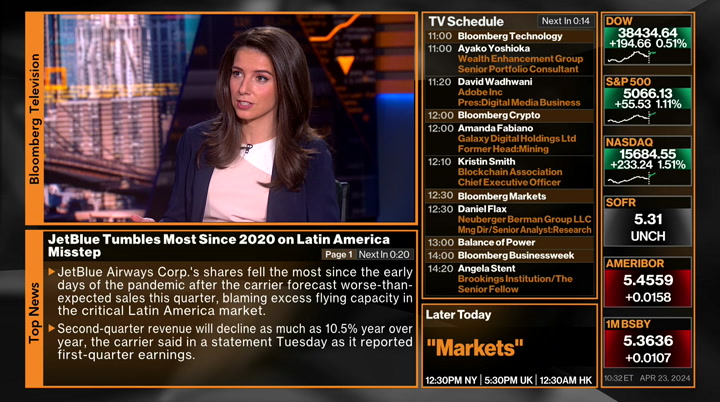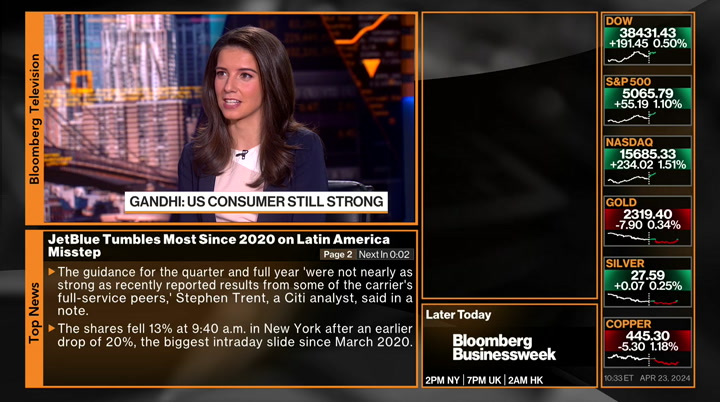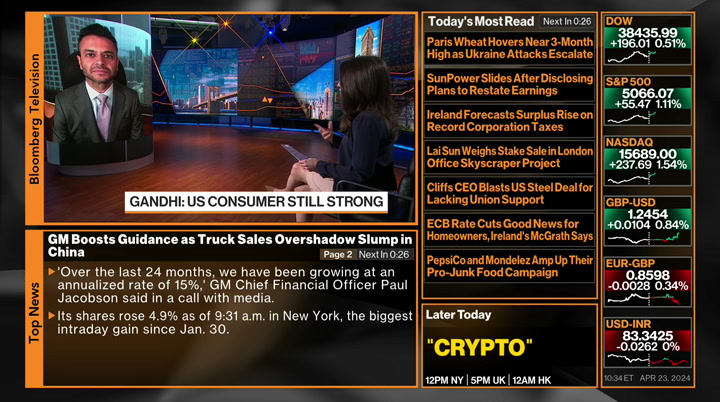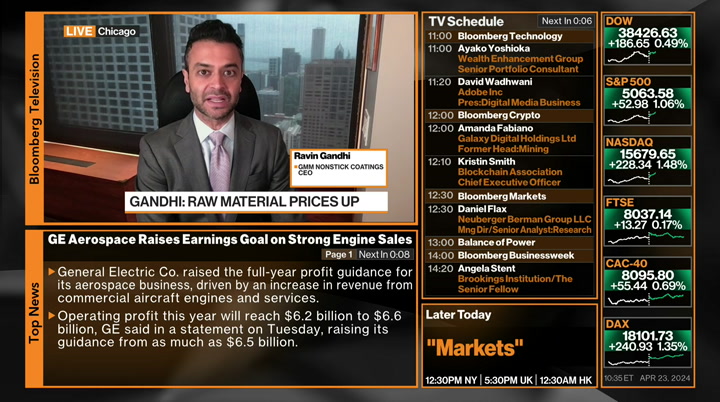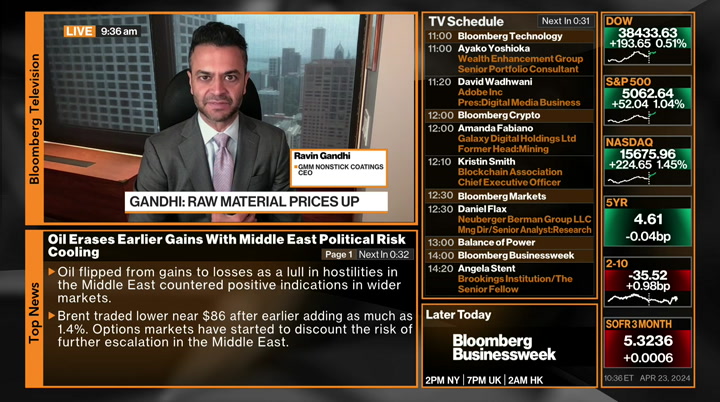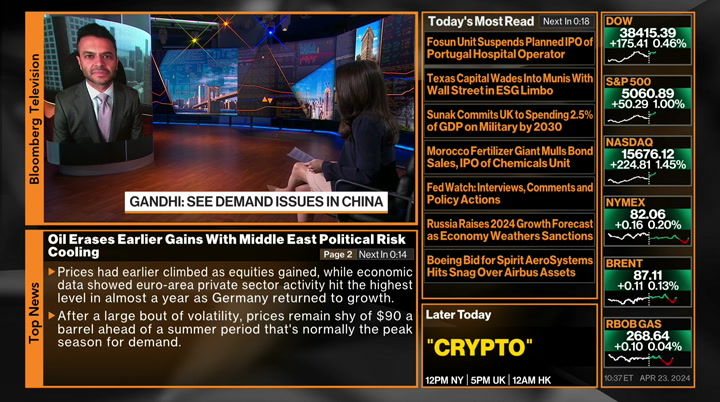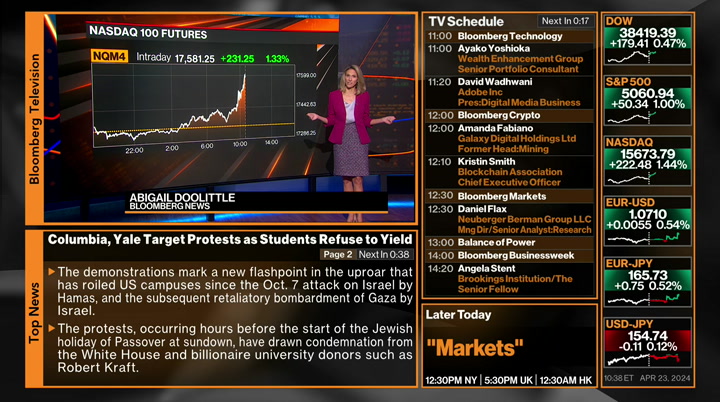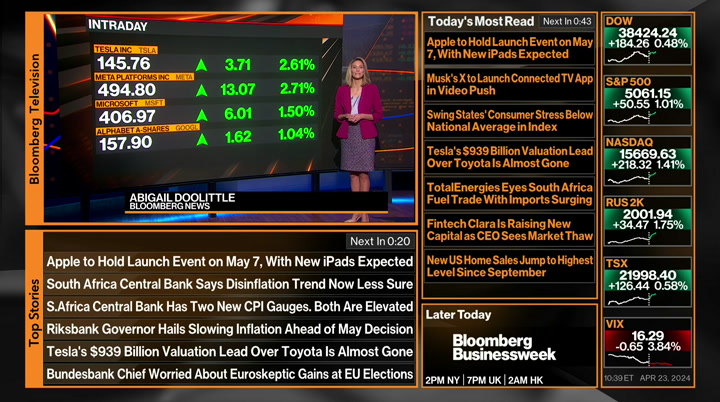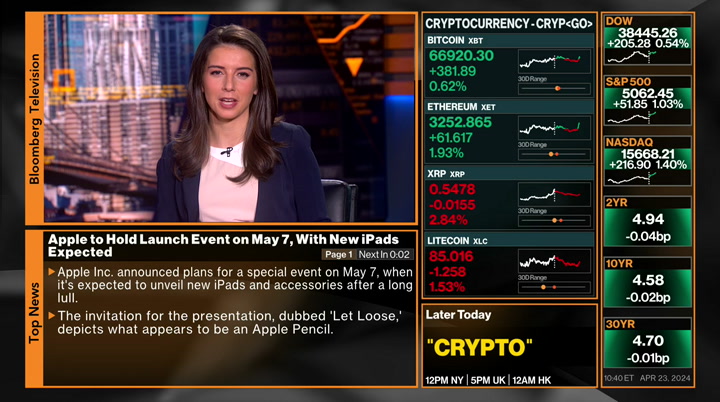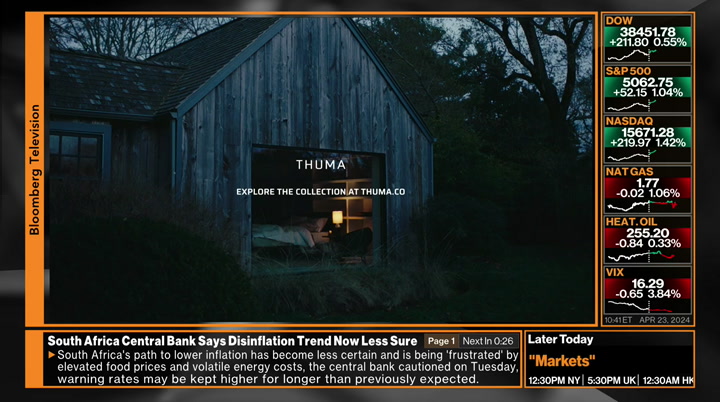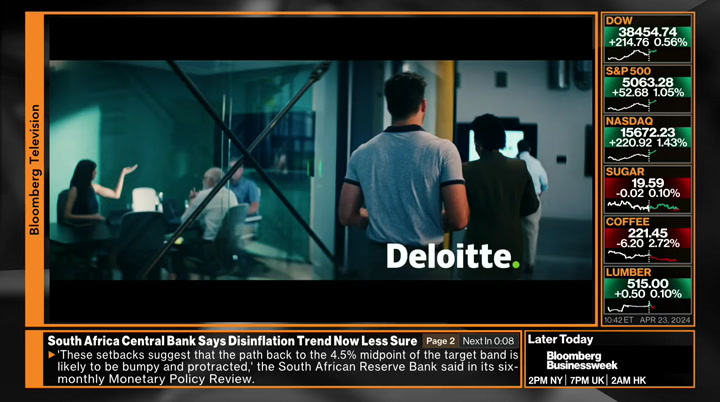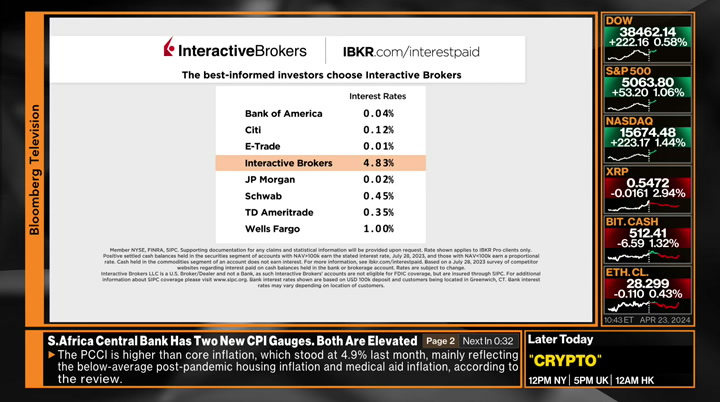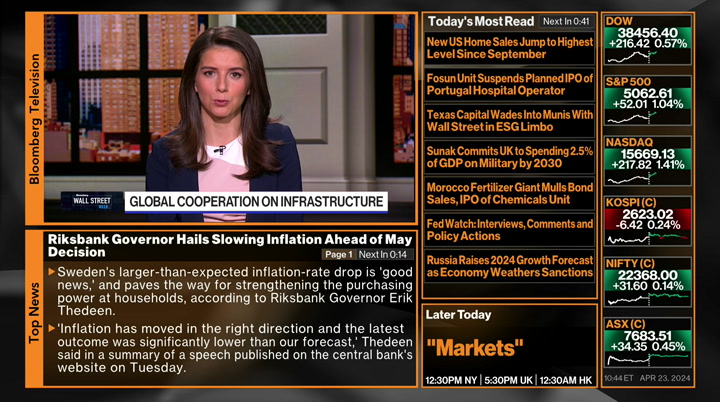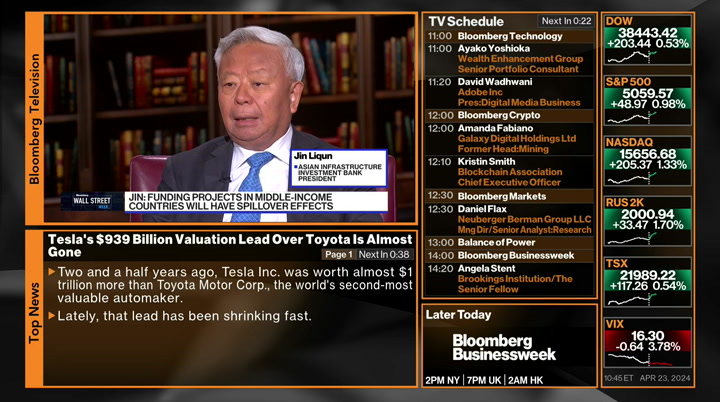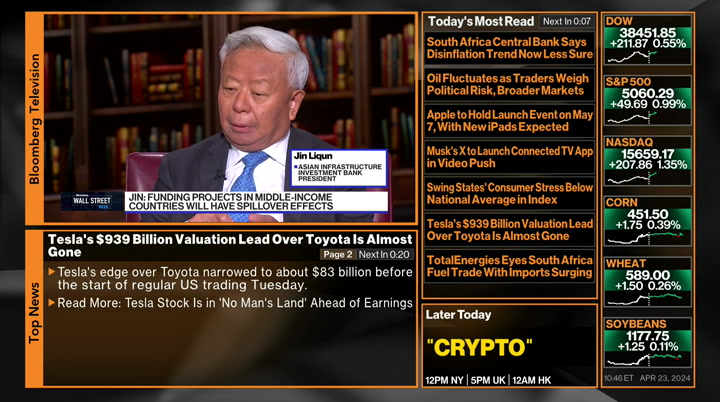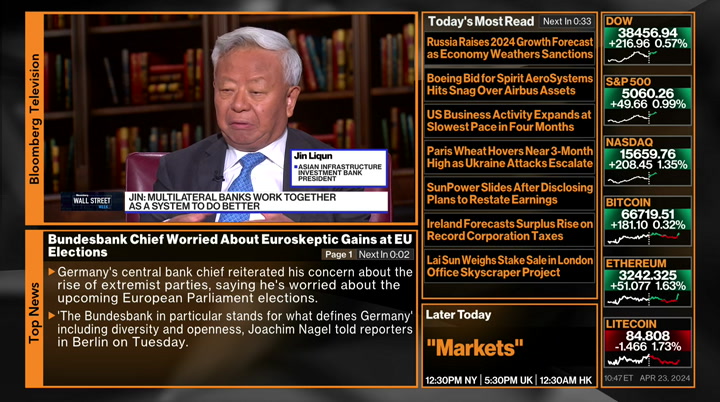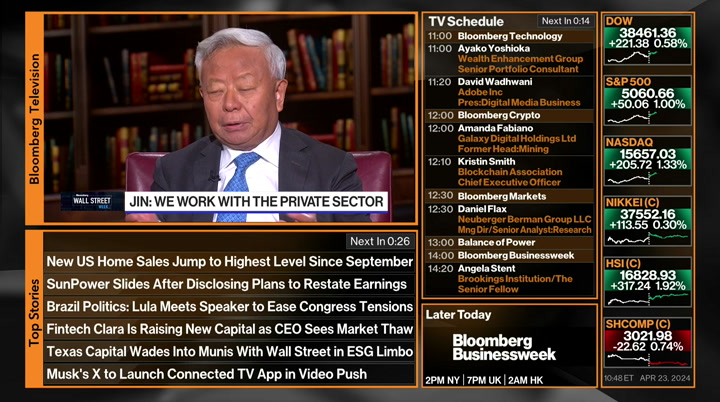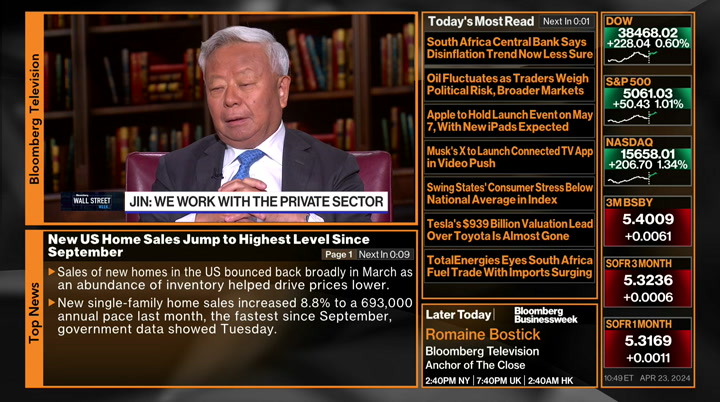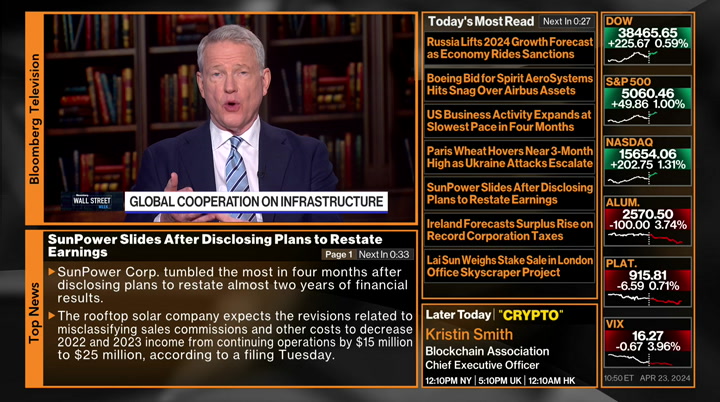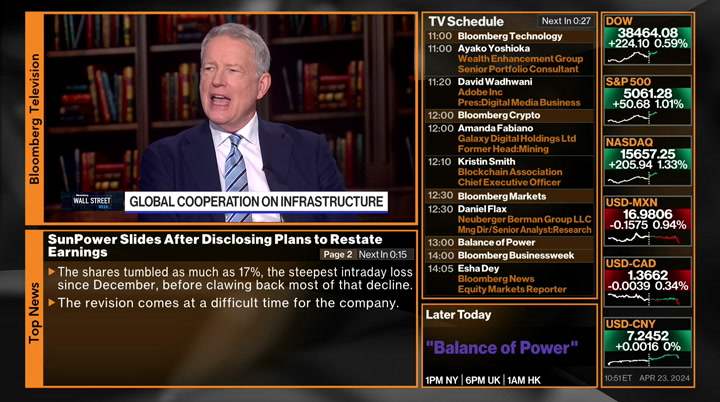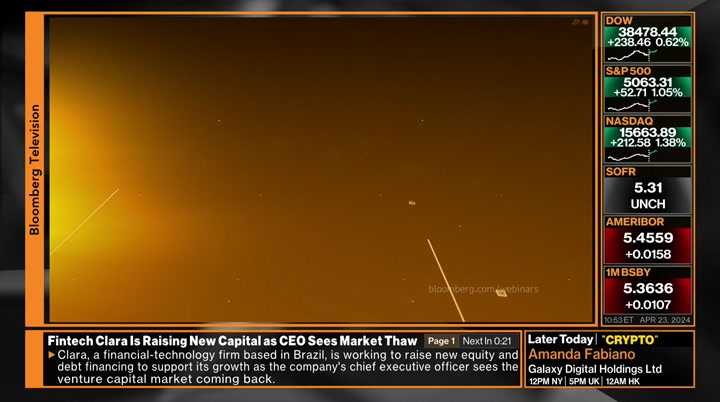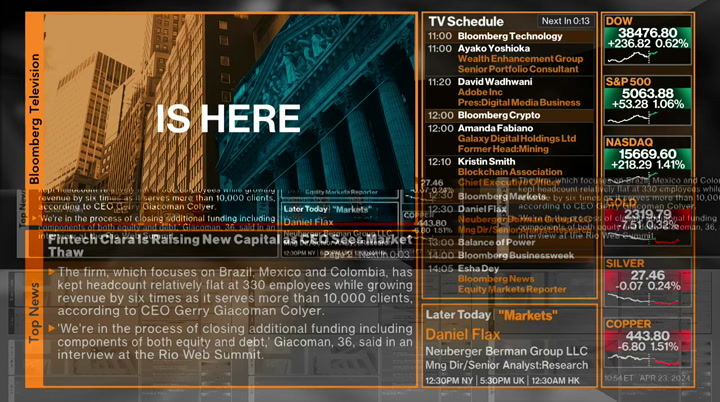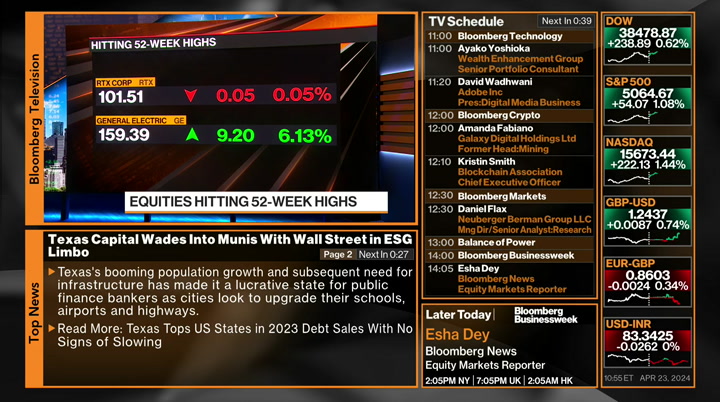tv Bloomberg Markets Bloomberg April 23, 2024 10:00am-11:00am EDT
10:00 am
katie: 30 minutes into the trading day. the moment of truth for tesla, earnings down 19% of the past week and lower by 43% so far this year. investors bracing for tesla's first revenue decline in four years. defense and aerospace of the bright spot, with rallies on the back of strong earnings. we will speak with greenwood c i/o on his take. business activity -- cio on his take. visiting -- business activity, he joins us to talk about what they say about manufacturers and consumers.
10:01 am
i'm katie greifeld in new york. welcome to "bloomberg markets." we have good news. stocks, s&p 500 up .7% so far. if these gains hold that would be the second straight day of wins for the s&p 500 which feels like hasn't happened in a while. big tech, the nasdaq 100 currently higher to the tune of .9% but as we know, everything can change tonight when we hear from tesla, kicking off a big week of earnings. i did want to check in with the bond market. it yields were at higher but now moving lower, the 10 year yield lower by two basis points, very quiet day so far. we will see if that holds. from the bond market to airlines , jetblue's nosedive's with revenue said to fall more than
10:02 am
anticipated this year thanks to bloated capacity in latin america. last month jetblue laid out plans to drop routes and we have the details. it is pretty brutal. at one point falling by the most since 2020. brooke: this has been the story of the past year for jetblue that they just had too much capacity and is way out of whack with what the underlying trends are and were chasing growth and it is not materializing. the perception was this was primarily a domestic problem. similar commentary from airlines like spirit which jetblue is trying to buy and failed to do so. but this is a stark problem in latin america that is driving the share pressure today and latin america is a significant portion of jetblue's network as well. manus: -- katie: we heard from
10:03 am
the likes of delta and united as well. and they are having trouble with that region. brooke: they are much more multifaceted and cater to premium customers and have bigger international options and are better positioned to whether this current environment for airlines. they are not immune to cost pressures like jetblue are facing but you are bigger and have different lines of business, that just helps you right now and you are seeing that disconnect in the airline industry between the larger carriers and those who are more domestically and regionally focused like jetblue. katie: is there anything we can extrapolate out from this or is this just a jetblue specific thing when you think about how dependent they are on latin america? will this be as big of an issue for other airlines? brooke: it still issues too much capacity in the airline industry right now. you seem jetblue lowering its
10:04 am
cap exit goal and others like spirit rethinking -- cap x goal and others like spirit rethinking. the demand for airplanes is high and they can't deliver them fast enough. it raises questions in terms of what the trajectory looks like and how the demand pattern shakes out over the next couple of years. katie: bloomberg's brooke sutherland, thank you. jetblue down by 14%, and ugly day for that airline. we are joined by walter todd, greenwood capital president and cio. great to have you with me. start broad and we will dial down. when we think about this earnings season and it feels like a lot of jitters have entered into the broad index as the s&p 500 definitely has seen massive declines over the past
10:05 am
couple of days or so. what are the stakes heading into the meat of this reporting season? walter: good morning. the set up into this earnings season has been somewhat questionable because the earnings have been good, 75% of companies have beat the expectations. it is about the guidance. you are seeing a lot of companies that are beating expectations for the first quarter but maintaining for the year which is under the radar for the back half. there is still uncertainty from companies when you listen to them. we are seeing a nice rebound the last couple of days. there was a selloff but not a big percentage decline but certain corners like technology and others got hit hard. it is nice to see some stabilization as we head into the meat of earnings with big names reporting later this week and next week.
10:06 am
katie: feels like a lot of companies have fared well but it feels like misses are there and is that what we should be following? walter: let's take jetblue that you were just talking about. they beat the numbers for the quarter and you would think expectations were low given the stock price performance and yet the guidance and outlook are what are hitting the stock. it is a mixed bag. jp morgan started earnings season a couple weeks ago at a decent call but the stock was down 6%. it depends on with the man approached fact trash is the day you are reporting and the guidance that dictates the stock price performance. katie: this is still very much a macro driven market and what does that mean for this trade that keeps trying to bloom?
10:07 am
we sawtek taking a backseat to under loved sectors at the end of 2023 in the past month it feels like we have seen a revival. do you think it has staying power? how much depends on earnings versus the macro like you were saying? walter: it is fascinating to watch this market. take the pmi's, you son eight basis point drop in the 10 year yield and you saw a total flip in the makeup of what was working and not working in the market just this morning. there is a lot of rotation and it looked like march was a widening out of the market that narrowed it back down and then we had the big tech selloff in the middle of the month. i think it is a combination of the two. earnings growth for the mag seven and the top of the market are good but slowing through this year. the other at hundred 90 stocks
10:08 am
on the s&p are estimated to see an acceleration in earnings as we move through 2024. that trade-off we feel is a drop off for companies outside of the "top" of the market. katie: you look at the data released this morning and we are talking about s&p services and composite pmi coming in below expectations, a significant drop in a yields of the back of that stock shooting higher as well. it feels like it goes to show how much this market is really rooting for rate cuts at this juncture and may be setting up for more disappointment on that front. walter: certainly a drop from seven down to 1.5 cuts and november is the first meeting with faux cut priced in. it feels like we have moved from one extreme to the other.
10:09 am
i think the truth is somewhere in the middle. i think the fed wants the cut to rebalance the yield curve but they are waiting for confirmation from the data. if you look away the market behaves as rates go up or down, that is your playbook and your outlook for the end of the year. if you think rates are peaking than the set up is for this markets may maybe broaden out beyond the top seven or 10 names. katie: what is your base case? walter: i think rates are peaking and i think we could see tce at the end of this week and we could continue to see a little bit hotter prints in the next few months. i think rates through the end of the year will be lower than they are today so that is kind of our outlook. i think the fed will probably get to cuts in before the end of the year. so a little more than markets pricing in at the moment. katie: we will be coming back to you. but let's take a look at what is
10:10 am
moving underneath the markets with emily. emily: you can see in the earnings this is a company facing softer demand for packages after the pandemic and less people have been shipping items at least through ups. the profit beat and adjusted be versus estimates. when you look at the revenue, although it beat, it was down 5% year over year. the average daily package volume was in line with estimates at 21 million but down 3.6% year over year. morgan stanley said they have an underweight rating on ups and it appears to be a healthy beat and might spark a modest relief rally looking at the earnings but doubt the numbers will come up for the market is going to
10:11 am
consider this a turnaround in light of the negative momentum we have seen with ups. katie: maybe we are seeing the modest relief rally. tell me about what is going on with spotify. emily: the stock is up 12%. this is a company where you can see they have increased prices and consumers have reacted positively, at least positive for spotify. the total premium subscribers grew 14% year-over-year which was in line with estimates and the total active user encompassing paying subscribers and streamers with as an that also group year-over-year. when you look at the revenue, that also beat estimates just slightly coming in at 3.6 4 billion versus estimate of 3.6 one billion. overall when you look at the bloomberg intelligence and analysis they said price hikes
10:12 am
are driving acceleration in both revenue for spotify and the average revenue spotify can make per user. a good earnings report and a positive start -- stock reaction. katie: shares up 12.5%. different with what is going on with pepsi and weakness specifically in north america. emily: more are facing higher inflation and probably turning to other alternatives. you look at the north american food and drinks division, they sold fewer goods by volume compared with a year earlier. drink volumes were down 5% in the region. the eps and revenue beat estimates put feels like shareholders are more focused on the volume decline. they had a recall for quicker food spec in january. i was not aware of this and i do
10:13 am
eat a lot of oatmeal. cereal bars and snacks, a risk of salmonella and seeing quaker oats revenue fell 24% in the quarter after the recall. katie: a great round up. coming up on this program, tough times for tesla. we will explore what investors will be watching after the ev maker reports after the bell. this is bloomberg. ♪
10:15 am
10:16 am
10:17 am
the idea of a $25,000 ev assessable is at the heart of global wall street around tesla. the retail investor cares about ai, robotaxi autonomy but we don't have clarity. elon musk needs to spell out, is the robotaxi the single priority now or is there still a version of the $25,000 ev that exists. we try to explain over the weekend what is happening. it is a technology initiative we believe late 2025 you will see a cheaper ev but versions of existing models, not standalone new models. katie: ed ludlow, you have a busy day ahead of you.
10:18 am
i appreciate some of your time. we are going to bring it back and walter todd of greenwood capital. let's talk about earnings we have seen as we count down to tesla. i want to talk about ge raising earnings goal and strong engine sales. that is a name you follow closely. what was your reaction to what we heard? manus: --walter: they were very upbeat about airspace and this was the first call they've had in multiple split ups of the company done to focus in on ge airspace. this is a site we own for our clients in portfolios and have it for a little bit. talking about jetblue, ge and the evolution of it since you joined bloomberg news seven or eight years ago. it is nice to see it come to fruition and focus on that.
10:19 am
we are evaluating ge and the spin out and we are waiting for the quarter and a couple of days. katie: when it comes to ge aerospace, that is standalone business. let's talk about that in the context of boeing. the largest producer of jet engines that go into the 737 max and the dreamliner. what effect has that had on ge aerospace that we can tell and does that give you pause when you think about the struggles boeing is currently mired in? walter: it certainly creates a headwind that fortunately ge surprised boeing and airbus as was mentioned earlier in the show. you have demand for new jet engines and new planes is really insatiable at this point. boeing unfortunately has had many well-documented travails.
10:20 am
hopefully they eventually get it right and that will be of further booze for ge airspace. listening to the call, there is no specific headwinds they are pointing to that will change their guidance. they raised it for the year despite beating this quarter as well. katie: it is interesting, some analysts saying that ge has a benefit from what we are seeing going on at boeing because airlines are going to have to be repairing and upgrading existing fleets and that should bode well. we will see how that plays out. let's talk about lockheed martin, a long turnaround at ge and you will think about what is going on at lockheed art in, it topped estimates and reiterated the 2024 outlook. the stock is not reacting with too much positivity and year to date it is lagging the major indices. what you make of what is
10:21 am
underway at lockheed martin? walter: ge aerospace and lockheed martin in two very different circumstances. lockheed has had some issues in the past year and a half particularly with the f-35 program. that has created headwinds for them in terms of deliveries. they did get a new contract with the missile defense agency recently that was announced, 17 million. there economy -- they are coming out of a couple difficult years. this year still scheduled to be down but reemerging in 2020 five and 2026 with nice double digit growth. we like the name here, relatively cheap valuation especially compared to other peers. it has a good dividend, two point 5, 1 of the higher yielding industrials and we think they are moving in the right direction. katie: when it comes to lockheed martin, how much of your thesis
10:22 am
rests on aid passing for israel? bloomberg intelligence has theorized that if the package passes, it is being voted on in the next couple of days, that could boost orders for the f-35. how are you thinking about that? walter: taking a step back from any specific place of trouble like israel or the middle east, unfortunately the geopolitical backdrop in general is creating a growth industry in defense. so whether that goes through or not, i think unfortunately the orders and backlogs are growing for all of these companies. if they can get the f-35 program running smoothly, we think that bodes well for their orders going forward. katie: great conversation, really covered a lot of ground. it walter todd of greenwood capital. we will take a look at the company is the most social buzz
10:25 am
katie: time for social climbers, a look at the stocks making waves on social media. general motors expecting more profits this year thanks to a robust truck sales in the u.s. the study for pickup trucks and suvs helping to offset weakness in china. $109 lost in the region which once upon a for $2 billion a year. we have apple trying to increase its toehold in the world of soccer. reportedly close to a deal with fifa that would give them tv rights for a world cup competition next year. if the deal goes through, it would mark apple's second major broadcast partnership in the
10:26 am
sport. and finally we had the ftc's saying it will block tapestries merged with capri. the first time that the biden and ministry has use antitrust to stop it. it would raise prices on handbags and accessories in the affordable luxury space. you can follow all of the latest company buzz on your bloomberg terminal. let's take a quick look at the market. an interesting turnaround after the manufacturing numbers from earlier. the s&p 500 currently up .9%, even more so if you look at big tech, the nasdaq 100 higher it bite than 1%. the 10 year down three basis points. u.s. business activity cools in april. the gm nonstick coating ceo is next. this is bloomberg. ♪
10:27 am
m hallucinating? what about zocdoc? so many options. yeah, and dr. xichun even takes your sketchy insurance. xi-chun, xi-chun, xi-chun! you've got more options than you know. book now. but starting it eight months pregnant, that's a different story. with the chase ink card, we got up and running in no time. earn unlimited 1.5% cash back on every purchase with the chase ink business unlimited card from chase for business.
10:30 am
katie: did this morning shows the s&p global u.s. manufacturing pmi is up to a four-month low in the latest reading. >> yes, pmi dropped 49 points. 49.9 in april down to 51.9 we saw in march. it is interesting that u.s. producers drew down stock purchases for a second consecutive month. we saw that inflation keeps rising but the pace is decelerating a little bit and drivers of inflation are changing a lot of it. risk producers are now facing higher costs and they are coming
10:31 am
from higher raw materials and higher energy prices. that is in contrast with services inflation we saw last year and that was mainly driven by wages inflation. we see that demand weakness also impacts hiring plans. that is mostly for u.s. services sector. that is a chart that shows u.s. manufacturing pmi dropping. demand weakness, plans for hiring also decelerating especially when it comes to the services sector and manufacturing employment continues to increase modestly. we all want to know how this will be translated into the stock market. so far, so good. we see the earnings beat from the u.s. largest producers. we saw results from general electric, gm.
10:32 am
if you compare u.s. industrial stocks versus the s&p 500, we see that industrials are now outperforming the s&p 500 of the year to date basis. katie: thank you so much for that set up. for more on the meta-factory picture -- manufacturing picture, we are joined by gmm's ceo. one of the leading suppliers of the cookware and electric appliance industry. great to have you with me. let's start with what we learned from the pmi numbers, reflecting some weakness in business activity. when you think about your customer base, are you seeing that as well? >> not really. i would say that things are still kind of hanging in there from my perspective. if there's going to be a downturn, i expect to see it for us in the next 60 days because that is when we see a material
10:33 am
spike in my business for the summer which ends up being the goods are produced for christmas. so far, it is so far, so good. katie: in 60 days time, that is when the christmas season starts, that is crazy. if you are someone that makes things, that makes sense. that is the side when we think about the actual businesses. tell me about the american consumer especially as we gear up for these key shopping milestone times. you thing about inflation in this country. it has disappointed a lot of people, policymakers included. is that weighing on the american consumer? ravin: it is such a hard question because we have seen a tremendous bounce in 2024 in my business versus 2023 in the face of these high rates. everyone is saying rates will stay up longer for later. we have seen a little bit of a selloff but so far, people are
10:34 am
hanging in there. i could go on and on about what i think from a governmental policy failures we've had, but for the moment, u.s. consumer is still pretty strong. i would also say that i am in this soft landing but i am also in the camp that says don't cut rates to suit. you can always cut them later if the data indicates it. katie: you are still in the soft landing camp. how much harder has that position gone over the past few months? how are you think about the fact things are still pretty robust? the economy is growing, but there is that concern. it tells like you don't necessarily share it that if we keep rates higher at this point, eventually it will hit the labor market, it will hit the growth picture. ravin: if you look at maybe my last 10 appearances on bloomberg, i have been somewhat bearish and eight or nine of them so i am generally a big
10:35 am
skeptic when it comes to looking at dark clouds on the horizon. at this point, i am really impressed with the strength of the consumer. you could not have thrown more things at the american consumer between 2022 and 2023. the fact that most companies are having beats is amazing or tickly in the u.s. -- amazing particularly in the u.s. think the american consumer is pretty strong. katie: before we leave the u.s., you talk about the strength and resilience of the american consumer. how is that affecting your thinking when it comes to potentially raising prices on your end? how are you thinking about how much pricing power you have left at this point? ravin: i usually have pretty low pricing power because all of my clients are these big multibillion-dollar corporations that have huge, sophisticated purchasing apparatus.
10:36 am
we have seen our raw material inputs go up about 4% this year. we have been able to absorb that because we have big teams of r&d people who are always trying to use value engineering to keep our costs going down by using different materials, but try to get the same quality with lower prices. if we get another raise, or in q3, we will pass it through. if we do, the game theory shifts to my clients and will they absorb it? will they be able to get walmart or target or amazon to say yes, let's raise prices. that is finally when it hits u.s. consumers. in years like 2022 when we were getting shopping inflation, everything was accelerating. right now, people a pretty confident with demand. katie: we will have to stay in touch on that point.
10:37 am
i appreciate you laying out the chain of you raising prices before a few steps. let's talk about china. you say it is a disaster. what does disaster mean? ravin: for us, it means absolute demand reduction from the local markets. 30%. 35%. a lot of our clients -- from a supply chain perspective, a lot of our multibillion-dollar american clients place orders with chinese factories and then order from my chinese factory. these chinese factories -- a lot of them make private label stuff that is used in the local markets there. that demand has fallen off a cliff. we have actually seen factories that employ thousands of people that we've known for many years have not opened up again after chinese new year. for anyone who knows china, those factories opened up about
10:38 am
30 days ago. we have people who have declared essentially chapter seven where they are liquidating their factories, selling off equipment. it is very dramatic was going on from a local demand in china perspective right now. katie: it is a fascinating point that it seems like china is an issue for everyone right now, whether you are tesla, apple or some of your customers you are talking about. it seems like that cut across industries. in the time i have left, are there any countries that are stepping up to fill that void? what about india for example? there's a lot of optimism around india. ravin: i have a lot of investments in india. i am very bullish on india. gmm has a large factor in india. i get texts and calls from a fair amount of clients almost on a weekly basis saying china, beyond being too expensive. everyone hates the geopolitical risks in china for obvious reasons. it is not whether biden or trump gets in office, they are both
10:39 am
very anti-china now. i think india is a good place to be. i think it is an extremely pro business country. i can only hope the u.s. keeps going pro business as well. katie: that is a good place to leave it. really appreciate your time today. thanks to ravin gandhi. we are about one hour into the u.s. trading session so let's get a check on the markets and we will do that with abigail doolittle. abigail: pretty solid gains for the s&p 500 and the nasdaq 100 on the weaker than expected pmi's, manufacturing pmi coming in at 49, below 50. in contraction, perhaps giving investors help the fed will be cutting this year maybe two or three times as opposed to not cutting it off. take a look at the nasdaq 100 at session highs. up more than 2%. the best two days going back to early march. the s&p 500 up about 1.5% over
10:40 am
the last two days. the best since late february. the recent declines not out of nowhere given the fact these are the best days in about two months. as for was happening beneath the hood, let's take a look at the big movers. tesla will be kicking off the big movers. the first up day in eight. a year-over-year basis, earnings and revenue are both expected to decline significantly. a lot of folks wondering what will elon musk say in terms of trying to reinvigorate enthusiasm for tesla. met up 2.75%. microsoft and alphabet. meta and microsoft, alphabet, to some degree on earnings very solid growth. meta, looking at 66% year-over-year growth for earnings. let's put all of this strength the last few days into the context of a chart we looked at before.
10:41 am
this is the nasdaq 100. you can see the uptrend started to break. this is when the buyers became less confident. the sellers a little stronger. below the 100 day moving average. today, back above it but this area is pretty heavy looking so it will be pretty important to monitor this to see whether or not these bowls can continue -- bulls can continue. i suspect it may not last but let's wait until all the earnings to come out. katie: it will be fun to watch those lines move around potentially over the next two weeks. abigail doolittle, thank you. coming up, global cooperation in infrastructure investment. the president of the asia infrastructure investment bank tells us how banks work together to address issues such as climate change. this is bloomberg. ♪
10:43 am
(upbeat music) there's more to business than the business you're in. if you use data, that's the privacy business. manufacturing on demand? you're talking cloud business. got a few million hyper-connected customers? digital experience business. that was fast. that's where deloitte comes in. with the right combination of talent and technology to help advance and connect all that it takes to excel in business ... to the business i'm in. deloitte.
10:44 am
10:45 am
this is bloomberg. katie: time now for the daily wall street week conversation and the world bank has some help in promoting global economic growth. multilateral banks focus on infrastructure step into capital necessary to fund new projects. jin liqun is the president of the asian infrastructure investment bank and he sat down with david westin to explain his bank's role. jin: asian infrastructure investment bank is a multilateral bank. in terms of the governors management practice, it is more or less the same as the other multilateral development banks. i would say it remains in the gene pool of mbb's.
10:46 am
it is created in the 21st century with the clear mandate to improve investment, to improve the regional and global economic integration. so, infrastructure for connectivity. infrastructure for tomorrow is the key. as you see, the world bank and imf cover the whole world. in the ensuing decades, other banks were created such as asian development bank, european bank for reconstruction development, and african bank. all of these banks are considered regional banks. they focus on the regional development in spite of the fact the members could be beyond the region. non-regional members as shareholders. we intend to be focusing on asia, but without limiting
10:47 am
ourselves to asia. david: how do you work with the other mdb's? jin: we work very well in collaboration with the world bank, adb, and other banks. because the development need is so vast that no single mdb can handle this on their own. it is very much important to make sure that it works as a system. we work together as a system so that we can deal better with the global challenges like climate change. so, let me give you some examples of our cooperation. we provide $1 billion guarantee to the world bank, so that they can release the money because o ur guarantee they can release the money and to new
10:48 am
investments. this is considered a very close cooperation because we are adequately capitalized where we can help them. and into american develop a bank is interested in working with us like that. we build up our assets quickly, and they have new capital to invest in new projects. working as a system, all the mdb's can manage to unlock $400 billion of capital to promote investment in climate change mitigation, adaptation, infrastructure development. a lot of important things we can do together. david: to what extent do you work with the private sector to leverage the u are talking about? there's a lot of talk about the public-private partnerships when it comes to infrastructure. jin: we make a point to work with the private sector. for the purpose of dealing with development challenges. private sector would be very
10:49 am
much a sensitive to the investment to the -- to the investment environment. investment climate of the country. one example, we are working on providing support to the member countries to improve the regulatory macro economic situations so that the enabling environment for green economy, for ned's zero transition would be accelerated -- net zero transition would be accelerated. if the enabling environment is approved, the private sector would feel comfortable to move into a country and put money there. this is what we are going to do. in addition to individual projects, we work with the private sector. there are lots of things we can do dealing with the capital market. mobilizing resources for climate change projects. so, i think our bank is
10:50 am
exploring new instruments so that we can do better to crowd in the private sector. david: what is the profile of the countries you are lending into? you said it is asia, but we have middle income countries, low income companies, and low income countries. what is the profile for you? jin: we finance development projects in low income countries, mid income countries, even higher income countries in that about the world -- the developing world. the purpose of doing this is twofold. one, we believe the development in individual countries are interrelated. if we can help the middle income countries to develop infrastructure, connectivity, it can have spillover effects on lower income countries. likewise, if we supported low income country, that would create even more opportunities, better opportunities for
10:51 am
neighboring countries. katie: that was jin liqun of the asian infrastructure investment bank and david westin joints me now. it was interesting hearing him describe this system that they have and working in concert with the other multilateral development banks. david: there are so many of them out there. you wonder how much they free up the capital because that is one of the big issues. the idea is this one -- this will unlock it. he didn't talk too much about it but they are somewhat leaner ends focused on the specific mission where some of the other development banks have expanded out their missions. katie: when it comes to unlocking this capital and getting it committed to projects, what kind of timeline are the operating on? david: what he said was their goal and money out the door in
10:52 am
less than two years. one of the challenges they have is good projects to fund and they have more money than they have to fund but they are trying to get it done fairly quickly and emphasis on climate. infrastructure to support a greener world. katie: big focus on climate and the conversation you are having at the end when it comes to the issue of poverty. how do you balance the focus. david: their approach is a little different from the world bank which may go at the poverty issue. there approaches that we can get development going there will be a spillover and that will help in the developing front and through the infrastructure lens to bring everybody up. katie: it will be interesting to track their progress. who else to we have coming up? david: tomorrow, we will talk to
10:53 am
wes edens. he found a new fortress energy. we will talk about what's going on in the liquid natural gas area. and where he thinks the energy market is going globally. katie: a lot to look forward to. thanks to david westin. this is bloomberg. ♪ when you automate sales tax with avalara, you don't have to worry about things like changing tax rates, exemption certificates or filing returns. avalarahhh ahhh
10:56 am
katie: let's take a look at some stocks hitting highs this morning. we start with defense giant rtx, hitting a 52-week high after beating estimates thanks in part to strong demand for missile defense systems. shares are currently unchanged, some of the gains coming back. you take a look at ge aerospace hitting highs after reporting positive results. the strong showing was driven by an increase in revenue from commercial aircraft engines and services. shares currently higher to the tune of about 6% as the broader market rallies. the s&p 500 currently higher by about 1% but everything could change tonight when we finally get those tesla earnings. bloomberg tech is coming up next. they will be all over it. that does it for bloomberg markets. i'm katie greifeld and this is bloomberg. ♪
10:57 am
11:00 am
>> this is "bloomberg technology." caroline: i am caroline hyde. ed: i am ed ludlow. caroline: facing its worst start of the year in china since the covid pandemic is a new report shows sales fell by 19% in the first quarter for apple. caroline: considering $95 billion aid package that could lead to a nationwide ban on tiktok. caroline: we push i did has the learnings -- earnings
69 Views
IN COLLECTIONS
Bloomberg TV Television Archive
Television Archive  Television Archive News Search Service
Television Archive News Search Service 
Uploaded by TV Archive on

 Live Music Archive
Live Music Archive Librivox Free Audio
Librivox Free Audio Metropolitan Museum
Metropolitan Museum Cleveland Museum of Art
Cleveland Museum of Art Internet Arcade
Internet Arcade Console Living Room
Console Living Room Open Library
Open Library American Libraries
American Libraries TV News
TV News Understanding 9/11
Understanding 9/11